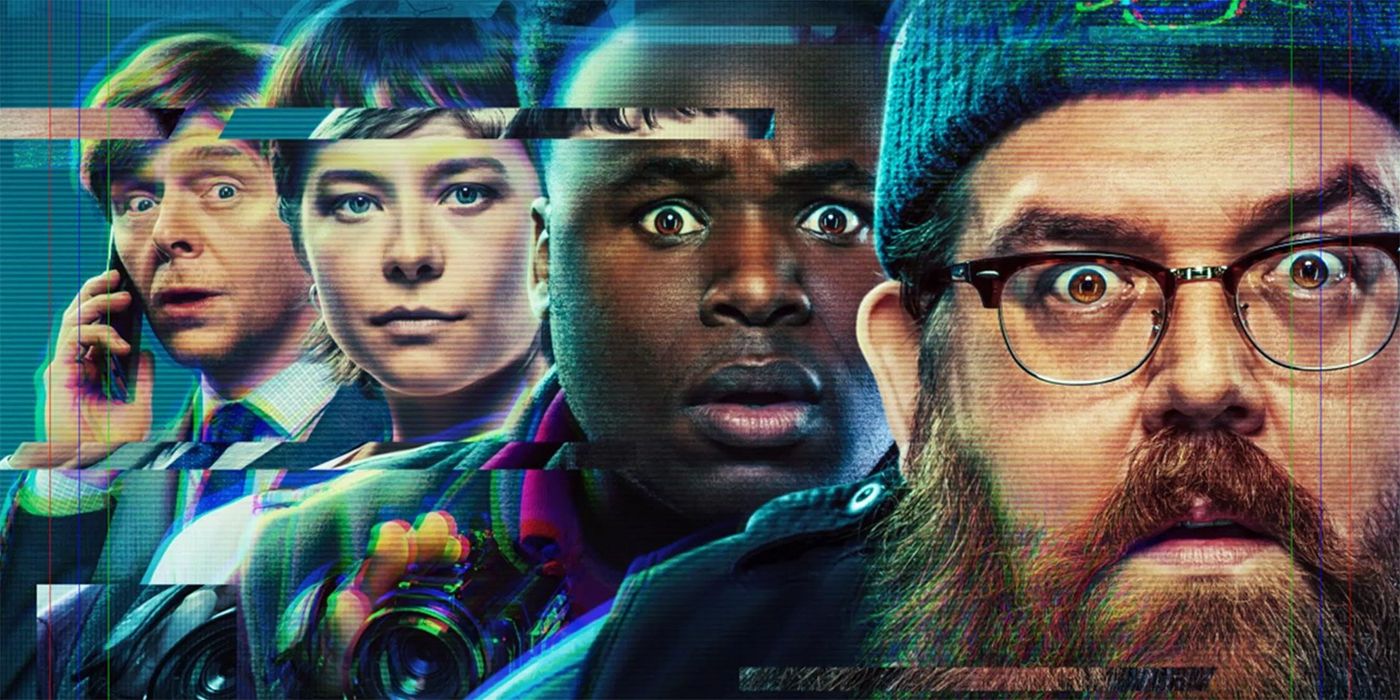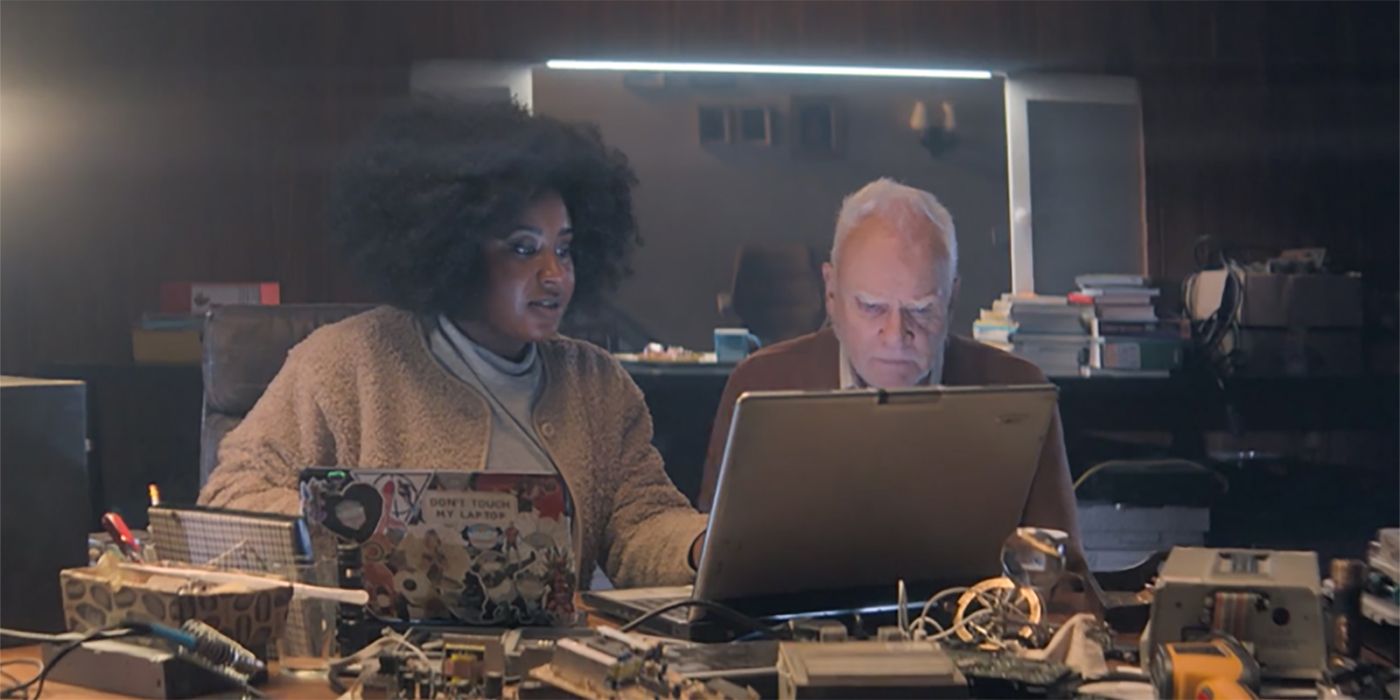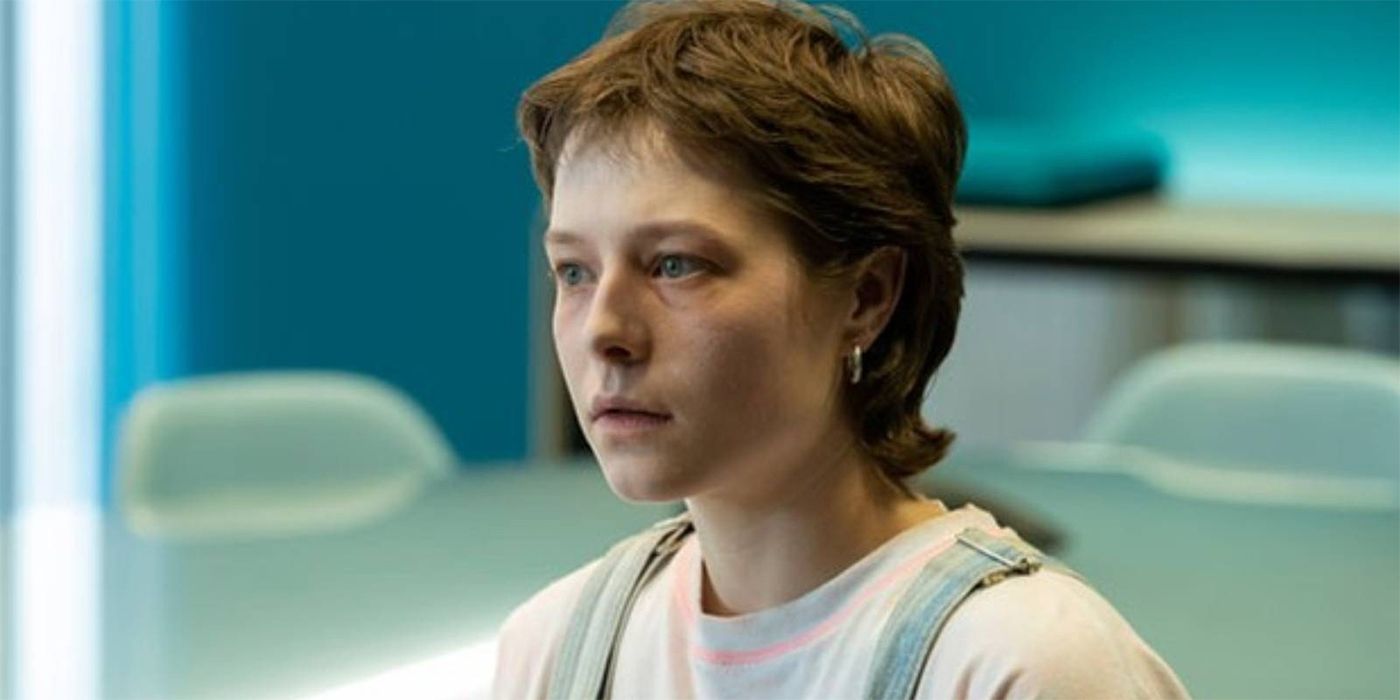Truth Seekers brings Nick Frost and Simon Pegg's signature brand of comedy horror - previously showcased in films such as At World's End - to Amazon Prime in an 8-episode first season. The series revolves around broadband installers Gus (Frost) and Elton (Samson Kayo) searching for ghosts in their downtime, and all of their acquaintances are drawn into the supernatural orbit as the episodes go on.
Susan Wokoma plays Helen, Elton's agoraphobic sister who makes popular makeup tutorials on Youtube, while Emma D'Arcy plays their mysterious new friend Astrid. Both women bring their own set of problems to the Ghostbusters-esque missions, which are dealt with in the latter half of the season.
At a recent press event, Wokoma and D'Arcy spoke to Screen Rant and other outlets about the British sensibilities of Truth Seekers, as well as about the blend of vulnerability and toughness present in their characters.
Susan, how was it creating that sibling dynamic with Samson Kayo? I heard you know each other in real life.
Susan Wokoma: Yeah. Well, I didn't know Samson that well, but we would see each other and we've got loads of mutual friends and stuff.
But it was easy. That was not a problem. Samson is a really, really funny guy. And I like it when someone can take the mick out of you, and he does that a lot to me, which I love. I love it. I'm like, "No, don't! Stop it." So, we had that dynamic straightaway. Easy peasy.
Helen's relationship with Richard was so genuinely lovely. How did you and Malcolm approach those scenes?
Susan Wokoma: Oh, hilarious. Literally just turned up and did it. Because Malcolm wasn't there at the read through, so literally, I met Malcolm on my first day. We have to buy that; we have to buy that relationship. So, it was pure luck that that happened.
But also, it's Malcolm McDowell, so I had some questions for him, just about him and life. I feel like when you have a genuine interest - which you should as a human being, but some people don't - but when you have a genuine interest in the other person that you're working with, you start talking and start getting to know each other. And it was really, really easy.
We didn't have to work that hard to get in a softness. I think we both knew what we wanted it to look like and to feel like, and loneliness is something that I think we all understand. So, it was great. He made it really easy, because it can be scary working with somebody that legendary. It's kind of mad.
What do you like about working in this comedy horror genre, and how do you approach it as an actor? Both of your characters have this kind of fragile aspect, but working ghosts gives both of your characters strength and energy to overcome their own problems.
Emma D'Arcy: Yeah, I love the genre, because I think it hits at something really specific in contemporary experience. We do live in an age where film references are as relevant as tales from our past and the stories of our families; all of that is interwoven. I think that is something that Nick and Simon have made, trying to create that sort of tapestry experience of reference. A kind of smash between living on a digital platform and living in three dimensional space. I think it's so clever.
As an actor, I think Astrid is sort of the straight guy to Nick and Samson's more comic worlds. So I think I was just sort of wide-eyed at everything, whether it was the comic style or a burning spirit. Overall, you sort of treat the same way, right? Because if it's comedy, it's funny because it's truthful. And if it's scary, it's scary because it's truthful. In a way, I don't feel that they're that dissimilar. And both are quite performative, whether it's doing scared acting or attempting to do funny acting. Both of those are quite theatrical.
Susan Wokoma: I didn't actually have much of a relationship with supernatural shows. I missed the train with Buffy; I was too busy watching Dawson's Creek. I was that guy until I did a show called Crazyhead, like, four years ago. My experience on that sort of changed what I have been looking for since.
I loved the fact that we are talking about the highest stakes, like, the end of the world. And my character has a role to play in the end of the world. I loved all the responsibility as an actor of that, rather than coming in and, "Hi, sir, I've got the files." That's boring. I just love the scope of that, and I've been looking for another project like that. So, yeah, I was just thrilled to be a part of this.
In regards to the fragility of the characters, I feel like a lot of the time you can play, particularly as a black woman, characters that are really super strong and can carry the world on their shoulders. I think one of the things that I am constantly looking for those parts that have subtleties to them. Now, Helen's not that subtle. She's a proper weirdo. But there is a softness to her, and there is a fragility that I think is beautiful, and isn't necessarily afforded to black female characters all the time. So, I really, really enjoyed that.
But she goes on her journey, and she learns to trust people and accept people and get to know people. But there is a softness to her, and I really enjoyed playing that.
Picking up on that, Helen is so complex with that hard exterior, yet she is actually a very lovely person. Can you talk a little bit about striking that balance and how you made this character so charming?
Susan Wokoma: Well, firstly, thank you. Secondly, I didn't set out to go, "I've got to make her as charming as possible." I think it's just letting the audience know how something moves you. Richard says something to her about letting people in that little bit more, and the shyness of doing that and the worry of doing that, it's just making sure that is much more on your sleeve a bit.
And that is a balance, because there are times when she does keep it locked up and in. It's just making sure that you're telegraphing exactly where the journey is going, I think. With Helen, she just popped up a little bit in the first four episodes, and then you see her a bit more, so I definitely had to track how much are is she - this is a horrible term - how much is she leaking. Like, the interior of what she's battling, how much are we seeing of that? The more she spends time with Richard, you kind of let that out. That's how I charted it; how much am I letting people see what's going on?
Emma, you could talk about the developing friendship, or maybe more than friendship, between Astrid and Elton?
Emma D'Arcy: Yeah. I think as soon as Astrid meets Elton, there's a sort of familiarity and an instant recognition somehow, even though they haven't met before. I think very quickly, there's a feeling of mutual trust there that develops very fast. And also, I think for Astrid, who is a bit placeless and a bit anchorless, it does feel quite quickly like she comes home to Elton; that she knows where she is somehow in his company.
Again, what a sweet TV series. It's not just someone's like, "Oh, I fancy you a bit. Do you wanna...?" No, it's all very platonic and sweet for a very long time. They hang out every day in the van, and they go do their Ghostbusters thing, and they become closer and get to know each other better. And then slowly, they think they have feelings for each other. It's just a really sweet and gradual closeness that they develop. At least within the first series, they don't have a huge amount of time on their own. So, I think we have to cross our fingers for series two.
Were you both aware of your characters arcs from the start? Because there's quite a lot of twists and turns throughout.
Susan Wokoma: Yeah, I was pretty much aware of where she would end up by the final episode. Helen's journey is that she basically is in the house, and then she's out the house, and that encompasses. She has no friends, and then she's got some friends. I knew that it would end with her being part of the gang, which is always really fun to chart: somebody having a coming of age story when they're in their 30s.
Emma D'Arcy: I think I also knew. I had a strong sense that we would start to unravel some of the question marks in Astrid's past going forward. And that, on the way, she would just tag along and go to work with Gus and Elton. Which was probably the bit that I was most excited about; being part of the kind of Scooby Doo genre.
Maybe what I didn't have a good sense of until we were midway through was some of the wider questions about where a second series might go, and what that might look like. I guess what I didn't know was that the world would just keep broadening, and I think that's what's kind of lovely structurally in the series. It feels like the boundaries keep getting pushed. The great mystery keeps being a step further away or a step more complex.
I would be so excited to see where the story goes from now, because I think even some of the domesticity in series one - I'd be interested to see what happens to that, in view of an even bigger conspiracy and bigger world.
Do you think there's a special British element of mixing humor and fear?
Susan Wokoma: I think it's also something that nobody does as well as Simon and Nick. For instance, Shaun Of the Dead is really funny, but with those zombies, we have to believe in the terror and the stakes of them. And they look really, really scary. It's not the same genre, but even with Hot Fuzz, the shootouts are a shootout - proper people are getting shot and shooting, and you believe that it's happening.
I think they understand that what humor does is it allows you to believe anything. I don't know enough to know whether it's something that the Brits do really well, but I know it's something that Simon and Nick are well-versed at and probably the best at doing.
Emma D'Arcy: I completely second all of that. I was just trying to work out: are Brits scared and funny? I don't know. We are scared; I'm quite scared.
Susan Wokoma: I think one thing that humor does is that it can stop you being too earnest. The thing that the Brits hate is somebody that's too earnest, and so I think that kind of going, "Oh, that's scary! But then also here's jokes," stops us from taking ourselves too seriously.
But the thing that Truth Seekers does that I think is really cool, is that everyone has a sense of humor, but also it is about loss. It's about grief. It's about trauma, and it's about really serious things. They've managed to add that element, which I think is probably something that has not been as much in the [Cornetto Trilogy] or in Spaced. But we have that in this. That's what makes it new, which is good.
The first season of Truth Seekers is now available to stream on Amazon Prime Video.



